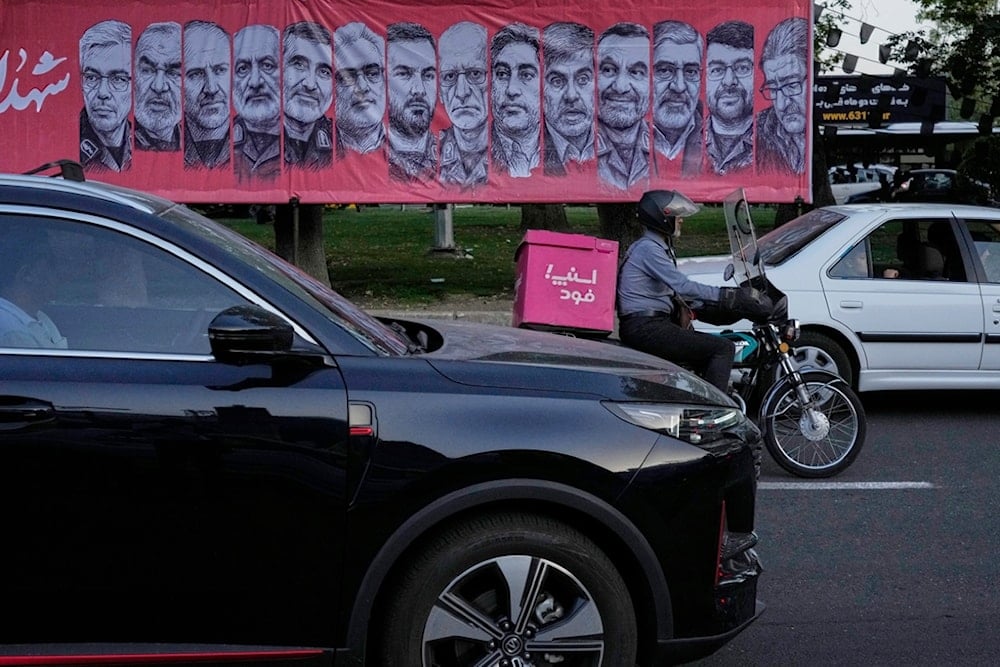Iran envisions a resistant, independent Middle East, Larijani says
Iran’s Ali Larijani says the new Middle East will resist foreign control as Tehran reviews US messages and condemns Israeli aggression.
-

Vehicles drive past a banner showing portraits of the Iranian armed forces commanders and nuclear scientists who were killed in an Israeli strike, at Tajrish Square in northern Tehran, Iran, Monday, June 30, 2025 (AP)
Ali Larijani, senior advisor to the Leader of the Islamic Revolution in Iran, stated Friday that the emerging Middle East will no longer follow the dictates of foreign powers, but rather embody a spirit of resistance. “The new Middle East will not be subject to external dictates. It will be a Middle East of resistance,” Larijani declared during a memorial ceremony held in Tehran.
His comments came during the funeral for martyr Mohammad Saeed Izadi, also known as Hajj Ramadan, who headed the Palestine Unit within the Quds Force and was killed in a recent Israeli attack on Iran.
No trust in Washington
Larijani reaffirmed Iran’s deep distrust toward the United States, citing its actions during and after recent conflicts. “After the war imposed on us, we no longer trust the United States,” he said. Nevertheless, he confirmed that Tehran is currently reviewing messages sent by Washington regarding a possible resumption of negotiations.
He criticized the American approach under Trump, describing it as binary and coercive. “Trump’s doctrine was: either surrender or face war. That model has failed miserably in recent years,” Larijani asserted.
UN, Security Council biased, irrelevant
In his remarks, Larijani also targeted international institutions, accusing them of losing credibility through their alignment with the US and the Israeli occupation. “The United Nations and Security Council have become a stage for farce and mockery,” he said, referencing their failure to act impartially on regional matters.
The senior official reiterated that Iran has emerged stronger from recent confrontations. “Netanyahu and Trump do not understand the greatness of the Iranian nation,” he said, arguing that the war demonstrated Iran’s deterrence capability and forced its adversaries into retreat.
In earlier statements, Larijani emphasized that the United States and the Israeli occupation have failed in their longstanding bid to destabilize the Islamic Republic. He claimed the recent Israeli strike, which killed Izadi and other Iranian personnel, only further exposed the strength of Iran and its ability to reshape the balance of power in the region.
Iran open to talks, demands guarantees
Iranian Foreign Minister Abbas Araghchi has reaffirmed that Tehran remains open to renewed dialogue with the United States over the nuclear file, but only under strict conditions, including clear guarantees against military aggression and a formal commitment from Washington to mutual respect and acknowledgment of past policy failures.
In an interview with the French publication Le Monde, Araghchi emphasized that while Iran does not reject diplomacy, it requires concrete assurances before returning to the negotiating table. “We must first receive guarantees that Washington will not resort to military action during the negotiations,” he said, adding that diplomatic patience is essential in light of past experiences.
Araghchi made it clear that Iran's missile capabilities are not subject to talks. “Our missile power is a defensive and deterrent force,” he said, adding, “It is not up for negotiation under any circumstances.”
The minister’s remarks come amid renewed international focus on reviving the stalled nuclear agreement, with global powers pressing for a framework that would limit Iran’s nuclear activities in exchange for sanctions relief.
Iran urges a new diplomatic approach
Reflecting on the breakdown in US-Iran diplomacy, Araghchi pointed to the “maximum pressure” campaign launched under US President Donald Trump's first term, which he said was characterized by contradictory messaging, calls for negotiation followed by threats and coercive measures.
He noted that Iran had refused direct negotiations with Washington but had entertained indirect talks, albeit under revised terms. These experiences, he said, underline why Tehran is cautious and insists on structural changes to how Washington approaches diplomacy with Iran.

 4 Min Read
4 Min Read










